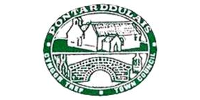Celebrations and Decline
Despite early promise of great things, there are only two references to Pontardulais Brass Band being active during 1899. The first was at a Pontardulais Church Bazaar held at Llandeilo Tal y Bont National School, under the conductorship of Mr D. Lewis (another new conductor!) where the band are reported to have “discoursed sweet music”. Incidentally, one of the main attractions of the bazaar (which was a two day event!), was a washing competition! (Although exactly who, or what, was washed is unfortunately unknown). The band’s second outing, in October 1899, was at Pontardulais FC’s first match at their new ground, against Garnant. Pontardulais defeated Garnant that day and newspaper reports that the “Morgan brothers of Pontardulais were simply immense”.
A concert given in aid of the Reservists held on Saturday 3rd February 1900 must have been a night to remember, as it featured a “galaxy of talent”, including Mr Evan R. Jones, the renowned elocutionist, alongside Pontardulais Male Voice Party, Pontardulais Orchestral Society, the Pontardulais Brass Band and a whole host of other artistes including singers, comedians and instrumentalists. It’s amazing to think that there was so much talent and so many musical groups active in Pontardulais at this time.
However, this concert was nothing compared to the excitement in Pontardulais later that year on Friday 18th May. The Cambrian Newspaper of 25th May 1900 reported the following:
“The glorious news was received here at 10 o’clock on Friday evening, and it spread at once like wildfire. All the pent-up enthusiasm of the last few days suddenly burst forth in wild hurrahs and outbursts of joy. Hooters were set going, fog-signals were fired, and bonfires blazed everywhere. All work was at once suspended at the various places of labour. Impromptu processions paraded the streets, headed by improvised bands, and rest and repose were out of the question. It was a never-to-be-forgotten sight. Most grave and reverend seniors vied with youth and urchin in their demonstrations of the universal joy. Saturday was recognised as a general holiday. On Monday the school-children, numbering close on a 1,000, and marshalled by their teachers, paraded the streets. The leading tradesmen closed their business establishments for the day and many other scenes of daily labour were likewise deserted. There are already four Baden-Powells in the place all born this week”.
What could possibly have precipitated such wild and joyous celebrations?
During 1900, the Boer War in South Africa was at its height, and at the centre of the war was the battle for the town of Mafeking. The Siege of Mafeking lasted 217 days and received considerable attention as Lord Edward Cecil, the son of the British Prime Minister, was besieged in the town. The relief of Mafeking (the lifting of the siege), on 16th May 1900, whilst of little military significance, was a morale boost for the struggling British, and turned the British commander, Colonel Robert Baden-Powell, into a national hero. The relief of Mafeking caused ecstatic joy in Britain, out of all proportion to its significance, and for a time the word ‘Mafeking’ meant to celebrate excessively.
It was very likely, though not reported, that at least some of the Pontardulais Band were part of that very band who paraded the streets of Pontardulais on ‘Mafeking’ night. It’s also interesting that after this night, the newspapers refer to a Pontardulais ‘Mafeking’ Band, who pop up on a few occasions in Pontardulais in the following years. Was this the Pontardulais Brass Band? Was it a splinter group? Given the number of people who would have had access to an instrument in 1900, it seems likely that the ‘Mafeking’ band would have included at least some members of the Pontardulais Brass Band, a band known for celebrating excessively – a long way indeed from those sedate temperance beginnings!
Great scenes were again witnessed in Pontardulais in June 1900, with the return of PTE G. Handford from Bloemfontein, South Africa. The Cambria newspaper reports “a huge demonstration took place in honour of the young soldier. A waggonette was procured, and Private Handford, accompanied by his father (Mr. Tom Handford) and Mr. E. Western (an old veteran, and a near relation of the hero of the hour), were drawn along the streets. The Pontardulais Brass Band headed the procession, and patriotic choruses were rendered by the crowd. The appearance of the waggonette was everywhere greeted with spontaneous cheering by the townsfolk along the line of route. Private Handford, thoroughly bronzed, and a trifle haggard, nevertheless looked remarkably well and presented a fine, soldier-like appearance”.
The Pontardulais Mafeking Band make an appearance in Pontardulais again in October 1900, with the Cambrian newspaper noting dryly that the place “was somewhat enlivened as a result”. Their appearance prompted “The Druid” of the Cambrian Newspaper, who it seems was something akin to a Pontardulais correspondent, to pose the question in his column “what has become of the real Pontardulais Brass Band?” The Druid is almost taunting when he adds “Will Bandmaster Lewis please speak up? We hope it has not gone the usual way such things generally go at Pontardulais”.
This prompted a furious response from Mr D. Lewis (by now another ex-conductor of Pontardulais Brass Band!) who writes that the “Real Pontardulais Brass Band” is now defunct. Mr Lewis also resolves “I have taken an active part in every brass band in Pontardulais for the last fifteen years, but have lately – in the light of recent events – made up my mind not to hold any connection whatever with another”. Oh dear – what on earth happened to provoke such a response from Bandmaster Lewis? His full letter to Druid is set out below:
26th October 1900 The Cambrian – THE BRASS BAND. MR. DAVID LEWIS REPLIES TO DRUID
In the columns of your last weeks issue, I came across the Pontardulais Notes by ‘Druid’ – a question about the Brass Band, addressed to myself. Your correspondent wants to know what has become of the ‘real band’. To relieve his anxiety, the band, as such has ceased to exist. What tended to bring this state of things about is what I mean to dwell upon if you will allow me a little of your valuable space – and to the best of my ability to find cause why this, and kindred organisations, fail to live for more than a certain period at Pontardulais.
Any organisation which has not unity amongst its members inevitably must collapse. I’m sorry to say that such was the case with the Pontardulais Town Band. Now I don’t want to tread unnecessarily on anyone’s susceptibilities; but the truth must be told, and until the destructive element which has proved the downfall of the ‘Band’ so many times before – as witness the fact that I was the third conductor in as many years – be completely eradicated and be kept out, it is useless thinking of resuscitating it.
But more than this. The interest taken in the Band, and the support received during the twelve months – more or less that I was a member, was almost nil. Allow me to give you a case in point. A certain tradesman in the place, who felt strongly on the subject, and advocated consistently and enthusiastically on behalf of a brass band, when asked for something towards getting new instruments, proudly handed over the magnificent sum of threepence, looking meanwhile as if he expected to see a brand new set of Bessons appear on the scene the following week.
There are exceptions, of course: but you can count them on the fingers of one hand. Taking them altogether, this is a fair sample of how your successful businessman looks at things in Pontardulais. We could mention several efforts in this direction which have reached untimely graves, this cause predominating. Such as the Sunday Schools demonstration on Whit-Monday; the United Choir; the Cricket, Tennis, and Football clubs. How often do we hear the expression ‘that nothing keeps up for any length of time in this place’: or that this or that innovation promises to be a success. In fact, the place is notorious for it’s unfulfilled promises. ‘Druid’ is pleased to hear that the Pontardulais Male Voice party, etc. is still going strong. Yet how many times has it expired of sheer inanition and inadequate support? But after all said and done, internal dissentions and lack of support are only effects after all. The real reason I assign why musical societies enjoy such a brief period of existence, is that they are not initiated in the right spirit. I find – after due consideration – that the strongest motive is not a love of music for its own sake but, ‘Will it benefit us financially?’ There would be no room for wranglings if this were not so. And they would still flourish without much outside support.
Now I do not say that they should refuse all and sundry monetary engagements, but to make these things secondary.
The Pontardulais Orchestral Society is a proof of what I affirm. It has been actively at work for the last six years and has enough vitality to go on for another sixteen, and more. The sole reason being is that they meet simply for the love of music, and the enjoyment derived therefrom.
But to return to ‘Druid’ and the ‘Brass Band’. I have taken an active part in every brass band in Pontardulais for the last fifteen years, but have lately – in the light of recent events – made up my mind not to hold any connection whatever with another, unless an outside committee is formed, in which all authority shall be vested. If ‘Druid’ has sufficient interest to formulate another band on these conditions or something similar, then I am prepared to do all in my power towards getting a ‘Real Brass Band’ again, which the place is sadly in need of. I remain yours etc.
Strong words indeed!
The Pontardulais Mafeking Band, by now often referred to as the ‘Notorious Mafeking Band’, remained in existence through 1901 and 1902 meeting returning soldiers at the railway station and parading them home, accompanied by friends and admirers.
Meanwhile the ‘Real Pontardulais Brass Band’ participate in one of the important events of 1901, when ‘local boy’ Rev. J. (Gwili Jenkins) wins the Crown of the National Eisteddfod.
9th August 1901 – Taken from Denver Evans ‘Bont’
Elaborate arrangements were made to accord the Crowned Bard with a reception back home deserving of such great success. On Friday evening, August 9th 1901, a tremendous crowd gathered at the Railway Station at Pontarddulais and with most people bearing flaming torches, Gwili was escorted by practically the whole population through the main streets of the village. This wonderful torchlight procession headed by the Town Band, was cheered all the way up the main street, then back down eventually ending up at the bard’s residence in Hendy.
This residence, almost opposite the present Hendy RFC Clubhouse, has now been decorated with a plaque in honour of Gwili, the local young man who became in time Archdruid.
Sadly, this is the last mention of Pontardulais Brass Band, and it seems after August 1901, the Pontardulais Brass Band is defunct once again.
There was no entry from Pontardulais Band to the ‘Monstre’ Brass Band Competition, under the auspices of Pontardulais and District Attractions Society in 1903, even though it was on home turf of Pontardulais. Reports of the day state the July the weather “kept up beautifully” and there was a record attendance – the weather was an extremely important factor in brass band competitions at this time, as generally competitions included a marching element and as such were often held outdoors.

The Cambrian Newspaper describes “painful sensations” which “cast a gloom” over the village of Pontardulais, were experienced one Wednesday in late October 1904, on hearing the news that Mr David Morris, the original conductor of Pontardulais Brass Band, died at the early age of 50. It seems this was a very sudden and unexpected death as “Tuesday, and as late as 11 o’clock last evening he was merrily chatting with some friends”. Sadly he left a wife and nine young children, and his death was attributed to heart disease. An immense crowd gathered to pay their respects at his funeral and at his memorial, music was provided by the choir and organ. Sadly, there is no mention of Pontardulais Brass Band to play their conductor out.






